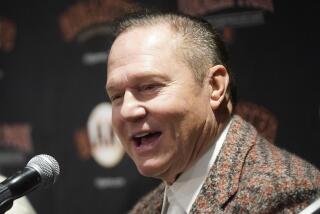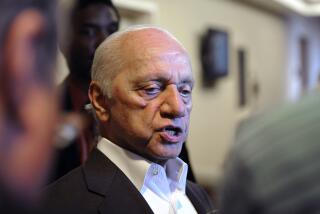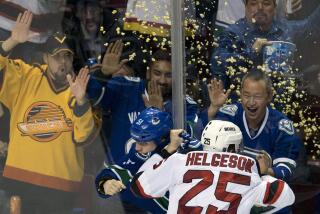NHL Union Leader Eagleson Keeps Owners in Check
- Share via
TORONTO — Almost 20 years ago, Alan Eagleson decided to form a players union in the National Hockey League after he won a battle against a minor league club owner who trained his goalies by literally stringing them up.
The atmosphere is more civilized now, but Eagleson, hockey’s international showman, its first player agent and head of the NHL Players Assn., is still fighting club owners.
Eagleson has kept labor peace in the league since the union was formed in 1967, but this year came close to shutting down the sport. He has the admiration and respect of hockey officials such as NHL President John Ziegler, who has faced Eagleson across the bargaining table off and on for 20 years.
Three developments led Eagleson--then a courtroom attorney and member of the legislature in the province of Ontario--to form the union.
One of those developments, actually the third but perhaps the most important, involved Eddie Shore, a hockey great of the 1930s who had become the eccentric owner of the Springfield Indians of the American Hockey League.
Eagleson, 53, tells the story of Shore, whose nephew was AHL president, training goaltenders by tying one end of a belt to a goalie’s neck and the other to the top of the crossbar. Shore, Eagleson said, wanted his goalies to stand up.
The Toronto attorney received a call from the Indians and intervened by threatening to shut down the league with a strike within one month. Within that month, Eagleson negotiated Shore’s retirement.
Earlier in 1966, hockey great Bobby Orr hired him to negotiate his first professional contract with the Boston Bruins. Boston General Manager Hap Emms refused to meet Eagleson, which, Eagleson said, raised a public furor.
Eagleson settled Orr’s contract in September, 1966, three days before he became embroiled in another controversy, the second of the developments that would to lead him to form the union.
Carl Brewer of the Toronto Maple Leafs wanted to quit professional hockey and play on an international level for Canada. The club refused to release the NHL All-Star and Eagleson intervened, creating “enough public tension” to force the team to give in.
Then came the Shore episode that sparked the formation of the union. Eagleson visited every NHL, AHL and Western League club and received a mandate to create the association. Of 400 players involved, Eagleson said, only two declined.
The association was recognized in June, 1967, as the formal bargaining agent for NHL players and “the owners were not very happy about it,” he said.
Today, Eagleson’s union numbers almost 500 and as executive-director the attorney considers it his job to get the best deal for the average guy.
“My job as the union head, in my opinion, is to create the most jobs for the most players at the best possible salary without putting a team out of business,” he said. “In conjunction with that, my union is made up of 500 players. There are 100 stars, 100 low quality players and 300 average players, and my job is to meld the thinking of the 500 into the thinking that benefits the average player.”
He said he believes hockey players have won substantial contracts. Average salary in the league is $165,000 and, while minimum wage is $25,000, no player currently earns less than $65,000.
“We’ve never had a player miss a paycheck and our average salary is good, our career is longer than it is in football,” Eagleson said. “It’s not a bad place to work.”
Earlier this year, Eagleson faced his toughest negotiations and brought the league to the brink of a strike. The two sides agreed, however, to a five-year contract that would see more player movement, increased pensions and lump-sum payments to certain retirees. It also would sharply cut back the number of 18-year-olds entering the league’s 21 clubs.
“My philosophy is very simple--a strike is an acknowledgement of failure,” said Eagleson. “Why should one seek to fail? I don’t seek to create a strike, I seek to create a solution.”
Eagleson has won league funding for an educational and career training program to provide players with a trade when they retire from the sport at the average age of 26.
He also has discussed informally with Ziegler a program to fight alcohol abuse, a problem he sees in the league.
“I think alcohol abuse is more of a problem than drug abuse in the National Hockey League,” Eagleson said. “I think there’s a common practice for players to sit and instead of having three beers after a game, to sit and have eight. And then it’s human nature to think they’re big and strong and macho and they should drive home.”
Those who have faced him in negotiations admire his quick mind and the fact that he is not one of whom to take advantage.
“There’s no question that his leadership and his plain business sense of what is good for his clients has been a major factor in there not being destructive confrontations, destructive for both sides,” said Ziegler, who as a lawyer for the Detroit Red Wings first negotiated with Eagleson.
At one time, Eagleson as an agent represented as many as 150 players in the NHL--greats such as Orr, Darryl Sittler and Marcel Dionne. Now, he represents about 35 and is not seeking new clients for that part of his business.
“Clientele walk in my front door,” he said. “I don’t knock on doors. The agents nowadays are getting players at age 13 and 14 and representing them, which is so silly. It gets the parents all concerned, it gets the kid thinking he’s an All-Star. A player doesn’t need an agent until after he’s drafted, and the best advice he can get is usually from his father or his family lawyer. Agents are sometimes the worst people to deal with.”
Married for 27 years, Eagleson also maintains his law practice with four lawyers and acts as counsel for Nabisco Brands Ltd. and Coca Cola in Canada. He also remains active in Ontario’s Conservative Party, for which he was a member of the legislature from 1963 to 1967 and party president from 1968 to 1976.
Eagleson, born in nearby Saint Catharines and raised in Toronto, also is the prime force behind the Canada Cup, an event held every four years that draws the highest quality of international hockey available. Eagleson regularly takes six trips a year to Europe to negotiate the Canada Cup and maintain his contacts.
He spends much time at major sporting events or at his cottage on Georgian Bay, where his children, Allen, 25, who has joined a large Toronto law firm, and Jill, 22, a law student, are teaching him to windsurf.
More to Read
Go beyond the scoreboard
Get the latest on L.A.'s teams in the daily Sports Report newsletter.
You may occasionally receive promotional content from the Los Angeles Times.







